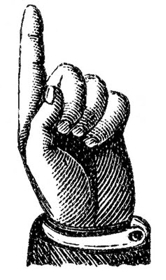Some of the earliest records of this surname (pronounced EYE-sham) occurred in eleventh century England. There are two Isham families that settled in the Colonies, one in Massachusetts and one in Virginia. The families migrated from Northamptonshire in England, where there was a village called Isham, near the Ise River, which is possibly where the family name was derived. Adding the suffix “ham” which means “home” to “Ise” would result in the family name of Isham.
Both of the American Isham families have interesting histories. One married into a well-known Virginia political family, the Randolphs, whose descendants include Thomas Jefferson and Edith Bolling Wilson (Woodrow’s second wife), Chief Justice John Marshall and General Robert E. Lee.
Captain Henry Isham
Henry Isham was born circa 1626-1628 in Northamptonshire to parents William and Mary Brett Isham. He migrated to Bermuda Hundred, Henrico, Virginia, situated along the James River, in 1656. He married Katherine (or Catherine) Banks, daughter of Christopher Banks, and they had at least three children: Henry, Mary and Anne.
Son Henry died young in 1678 and never married. Mary and Anne married prominent men, however.
Mary Isham Randolph
Mary Isham was born circa 1658 in Bermuda Hundred. In 1678 she married Colonel William Randolph, who had immigrated in 1674 and settled on “Turkey Island” in Henrico County, Virginia. William was a member of the House of Burgesses and served as its Speaker in 1698.
Mary bore nine children – seven sons and two daughters: William, Thomas, Isham, Richard, John, Henry, Edward, Mary, and Elizabeth.
Isham’s daughter, Jane, was the wife of Peter Jefferson and mother to Thomas Jefferson of Monticello.
Richard’s family intermarried with the Bolling family (Edith Bolling Wilson). Sister Anne’s family also intermarried with the Bollings.
Daughter Mary’s son William Stith was the third president of William and Mary College from 1752-1755. His grandfather William Randolph had helped found the College and also served as a trustee.
Anne Isham Eppes
Anne married Colonel Francis Eppes and to their marriage were born seven children, according to one family historian: Francis, Isham, William, Elizabeth, Mary, Sarah and Anne.
Martha Eppes, Francis and Anne’s granddaughter, married John Wayles and they were the parents of Martha Wayles, wife of Thomas Jefferson, so they were cousins having the same great-great grandfather, Captain Henry Isham. Henry and Katherine were also third great-grandparents of Chief Justice John Marshall and fourth-great grandparents of General Robert E. Lee.
John Isham (Massachusetts)
John Isham of Barnstable, Massachusetts was born on March 31, 1654, either in England or Virginia — I could not locate any sources that knew for sure. According to A Survey of The Ishams in England and America published in 1938, at that time there had been three traditions about John’s origin and how he came to New England, although only one seemed probable. One tradition was dismissed as “worthless”, another was described as “concocted by some unscrupulous genealogist for consumption by credulous and trusting Americans.”
 The third tradition, according to author Homer Brainard, seemed to indicate the possibility that John might have been in Virginia before going to Massachusetts. Records indicated that in 1670 Virginia authorities demanded from Plymouth authorities that James Percival be extradited, he being accused of running away from Virginia with a boat. Brainard thought it possible that if Percival had companions, perhaps John Isham was one of them and that they might have wanted to escape political tensions and antagonisms which were brewing during that time in Virginia.
The third tradition, according to author Homer Brainard, seemed to indicate the possibility that John might have been in Virginia before going to Massachusetts. Records indicated that in 1670 Virginia authorities demanded from Plymouth authorities that James Percival be extradited, he being accused of running away from Virginia with a boat. Brainard thought it possible that if Percival had companions, perhaps John Isham was one of them and that they might have wanted to escape political tensions and antagonisms which were brewing during that time in Virginia.
John married Jane Parker, member of a prominent Barnstable family, on December 16, 1677. John and Jane had ten children: Jane, John, Isaac, Sarah, Mary, Patience, Hannah, Joseph and Thankful. John became a freeman in 1691 under a new charter uniting Plymouth with the Bay Colonies (Puritans vs. Separatists).
The new charter no longer required church membership in order to vote, although it is uncertain what faith John Isham practiced, as the records of the Congregational Church of Barnstable have no record of his membership nor the births or baptisms of his children. One family historian noted that he was tolerant towards Quakers, having been the witness for one prominent Quaker’s will. Puritans were known to be highly intolerant of Quakers (see previous article on Puritans vs. Quakers), so it seems unlikely he was a Puritan.
John Isham died September 3, 1713 in Barnstable. His grandchildren served in the Revolutionary War, and his great-grandson Jirah was a general during the War of 1812.
I could go on extensively about this family’s history. When I selected this surname for an article, little did I know how prominently it impacted history with so many American historical figures descended from it — just another reason why I am “Diggin’ History”!
 Did you enjoy this article? Yes? Check out Digging History Magazine. Since January 2018 new articles are published in a digital magazine (PDF) available by individual issue purchase or subscription (with three options). Most issues run between 70-85 pages, filled with articles of interest to history-lovers and genealogists — it’s all history, right? 🙂 No ads — just carefully-researched, well-written stories, complete with footnotes and sources.
Did you enjoy this article? Yes? Check out Digging History Magazine. Since January 2018 new articles are published in a digital magazine (PDF) available by individual issue purchase or subscription (with three options). Most issues run between 70-85 pages, filled with articles of interest to history-lovers and genealogists — it’s all history, right? 🙂 No ads — just carefully-researched, well-written stories, complete with footnotes and sources.
Want to know more or try out a free issue? You can download either (or both) of the January-February 2019 and March-April 2019 issues here: https://digging-history.com/free-samples/
Thanks for stopping by!
Hi I’m so intrigued buy this because my last name is Isham I was adopted by another family but years later fond my birth father and my brothers,and cousins yet still know nothing about my family except that we are English and also have some Blackfoot Indian in Us I want to learn all I can about my family and to see which of the two I’m related to thank you for posting this it’s a lot of help and I finally know a little more about my family’s history.
Thank you,
Albert Wayne Isham jr.
So glad you enjoyed the article and found it informative …thanks for stopping by. If you need help researching your family, see the Services link on the blog for more information.
Hi Sharon, Is this the actual family crest?
Margaret
That I don’t know. At the time I was writing the Surname Saturday articles I used images from a web site (4crests.com), although I’m not entirely sure whether this is an actual crest for Isham. The family name is listed in Burke’s General Armory: https://archive.org/stream/generalarmoryofe00burk#page/532/mode/2up. Thanks for stopping by!
Different Crest
https://www.zazzle.com/isham_family_crest_postcard-239298530413524153
Crest same as OP
https://www.bonanza.com/listings/Isham-Family-Crest-Coat-of-Arms-JPG-or-PDF-Image-Download/289117733
I’ve seen 2 different types or designs of the Isham Family Crest. In addition there’s an Isham Family Coat of Arms (flag) that is identical to the Crest pictured in this OP (original post).
https://www.bonanza.com/listings/Isham-Coat-of-Arms-Flag-Family-Crest-Flag/290892162
Different crests in another post to follow.
I am a Isham descendant, through Anne Isham that married William Smith in 1726 or 1734. Anne you mention here could also be an ancestor, but I’ve yet to make the connection. What are your sources for Anne Isham Epps? Thanks in advance!
I am unable to locate the original source. However, this book may be helpful — see pages 90-92 for information on Ann and Colonel Francis Eppes:
“A survey of the Ishams in England and America; eight hundred and fifty years of history and genealogy” (https://archive.org/details/surveyofishamsin00brai). Thanks for stopping by!
I am a descendant of the Anne Isham mentioned and she was married to Francis Eppes.
Thomas Jefferson was married to my 2nd cousin 17x removed Martha Wayles ,it is an interesting note that she suffered from Diabetes , almost every member of my family, cousins , Aunts , Uncles , Parents , and myself suffer from diabetes too ,I never realized how young she passed until this article and how grief stricken her husband was , this puts a very personal touch on such a public figure .
Sincerely ,
Celette Rae Waddell (My name is unusual but it is a area in France ,now I understand the meaning behind the name I have always hated)
Thanks for stopping by and sharing!
Waddell is a name sometimes heard in the Richmond, VA area.
Thank you for the article! I’m doing some genealogical digging and seem to be stuck at John, my 9x great grandfather. I like the story though!
I’m wondering if you have any information about Henry Isham being the father of Elijah Isham (both of Roane County, TN). Our local historian found a court case over a lumber dispute that links Elijah Isham as the brother of Preston Isham.http://www.genealogy.com/forum/surnames/topics/isham/829/ But I’m still seeking the actual sources that link Henry to Elijah. It seems that most Ishams in the U.S. originate from the Barnstable, Mass John Isham. It seems the family moved to Colchester, Conn pre-Revolutionary War and were a part of the Connecticut minutemen.
How fascinating would it be to link John Isham somehow to Capt. Henry Isham of Virginia. Finding that historical jewel would be priceless for Isham history. Where was John Isham from Virginia? We may never know until we get to heaven and hopefully see him and ask 🙂
Does anyone have any information about Paul Benton Isham? Father of Russell A. Isham, Father of Paul J. Isham.
I don’t know anything currently but you could sign up for a one month free trial with sites such as ancestry.com, fold3, and others. Your local court house historian might be able to help you as well.
John Smith was my third great grandfather. I believe his father was Moses Smith, who I believe was a son of William Isham Smith and Hannah Jackson. Do you by chance have any information that would confirm or debunk that working theory? Thank you.
I don’t have any information on the Smith family but it’s quite likely they are somehow connected to the Isham family given William’s middle name.
William Isham Smith was a son of Ann Isham, daughter of Henry and Katherine (Banks) Isham.
I am a Descendant to Laura Virginia Isham 1863/1947 (2 great grandmother) married Henry Paul Gray1862/1930.. Any and all info would be great .. who is John Isham 1654/1713 father ? (m) Jane Parker.
I am a descendant of Wilbur Isham and Lydia (Jones) Isham. They were my great grandparents. Lydia was born on February 5, 1874 and died in 1972 at age 98.
Hi Sharon,
I’m a descendant of John Isham. My father, Allan Burbeck Isham, grew up in Pembroke, Mass. My grandmother was a great genealogy buff, and passed on much of her research to my Father and my Uncle John. I remember the family crest that hung with family pictures: three silver wavy rays over a swan.
Sorry, this is close to what I remember:
https://goo.gl/images/EaLQc4